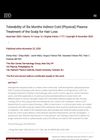 February 2023 in “Sibirskij onkologičeskij žurnal”
February 2023 in “Sibirskij onkologičeskij žurnal” Chemotherapy often causes hair loss in cancer patients, affecting their mental health, but scalp cooling can help prevent it.
52 citations,
November 2013 in “Journal of Pain and Symptom Management” Cryotherapy helps reduce chemotherapy side effects but needs more research for best use.
[object Object] January 2021 in “Annals of translational medicine” YH0618 helped reduce skin and nail problems and fatigue in chemotherapy patients.
40 citations,
September 2007 in “Bone marrow transplantation” Certain chemotherapy drugs can cause permanent hair loss in stem cell transplant patients.
27 citations,
March 2008 in “Cell stress & chaperones” Localized heat or specific injections can prevent chemotherapy-induced hair loss without affecting cancer treatment.
12 citations,
May 2015 in “Journal of the National Comprehensive Cancer Network” Doctors should actively prevent and treat skin side effects in cancer patients to keep them on the best medication and reduce discomfort.
8 citations,
February 2018 in “European journal of oncology nursing” The Hair Check tool can measure hair loss, but patients' own reports are more reliable for assessing hair loss during chemotherapy.
 4 citations,
March 2023 in “Current Oncology”
4 citations,
March 2023 in “Current Oncology” Scalp cooling is the only FDA-approved method to prevent hair loss from chemotherapy, but other treatments like minoxidil and PRP are being tested.
[object Object]  September 2024 in “Current Oncology”
September 2024 in “Current Oncology” Docetaxel often causes hair loss, with limited effective treatments and no cure for permanent hair loss.
 1 citations,
April 2019 in “Journal of Investigative Dermatology”
1 citations,
April 2019 in “Journal of Investigative Dermatology” Cold atmospheric plasma may speed up wound healing and control infections.
 February 2023 in “Scientific Reports”
February 2023 in “Scientific Reports” Cold Atmospheric Microwave Plasma (CAMP) helps hair cells grow and could potentially treat hair loss.
 8 citations,
July 2022 in “International Journal of Molecular Sciences”
8 citations,
July 2022 in “International Journal of Molecular Sciences” Skin cells release substances important for healing and fighting infection, and understanding these could improve skin disorder treatments.
 13 citations,
November 2021 in “Biomedicines”
13 citations,
November 2021 in “Biomedicines” Plasma-activated liquid can kill harmful cells, speed up wound healing, and potentially treat cancer without damaging healthy cells.
 46 citations,
January 2020 in “Research”
46 citations,
January 2020 in “Research” Microneedle technology has advanced for painless drug delivery and sensitive detection but faces a gap between experimental use and clinical needs.
 3 citations,
November 2020 in “Journal of Drugs in Dermatology”
3 citations,
November 2020 in “Journal of Drugs in Dermatology” Cold plasma treatment for hair loss was well tolerated and showed improvement in most patients.
11 citations,
June 2018 in “Annales de dermatologie et de vénéréologie” Hair care products can cause skin irritation and allergies.
 December 2022 in “Türk biyokimya dergisi”
December 2022 in “Türk biyokimya dergisi” The conclusions are: fecal short-chain fatty acids may help prevent cancer, fiber intake can reduce obesity, weight loss is hard for obese people, low BMI cancer patients are more prone to chemotherapy side effects, intermittent fasting benefits gut health, cherry laurel has health benefits in rats, certain gene variations can increase stress in hair loss patients, fecal acids can affect blood sugar levels, cold agglutinin can affect blood test results in autoimmune patients, and people with Crohn's disease have higher levels of a certain chemical in their blood.
 3 citations,
January 1988 in “PubMed”
3 citations,
January 1988 in “PubMed” The review found that basal cell carcinomas on the scalp are not more aggressive than those in other locations.
 1 citations,
January 2015 in “Springer eBooks”
1 citations,
January 2015 in “Springer eBooks” Chemotherapy can cause skin side effects that affect patients' lives, but they can be managed to avoid interrupting cancer treatment.
 13 citations,
July 2020 in “bioRxiv (Cold Spring Harbor Laboratory)”
13 citations,
July 2020 in “bioRxiv (Cold Spring Harbor Laboratory)” Four drugs were found that could potentially treat COVID-19 by inhibiting the virus in lab tests.
 81 citations,
June 2014 in “Cold Spring Harbor perspectives in medicine”
81 citations,
June 2014 in “Cold Spring Harbor perspectives in medicine” Skin has specialized touch receptors that can tell different sensations apart.
 7 citations,
January 2019 in “Brazilian Journal of Pharmaceutical Sciences”
7 citations,
January 2019 in “Brazilian Journal of Pharmaceutical Sciences” Maidenhair fern extract reduced anxiety and depression in rats and may work due to its antioxidant and anti-inflammatory properties.
 2 citations,
May 2023 in “bioRxiv (Cold Spring Harbor Laboratory)”
2 citations,
May 2023 in “bioRxiv (Cold Spring Harbor Laboratory)” Sebaceous glands can heal and regenerate after injury using their own stem cells and help from hair follicle cells.
 1 citations,
April 2023 in “bioRxiv (Cold Spring Harbor Laboratory)”
1 citations,
April 2023 in “bioRxiv (Cold Spring Harbor Laboratory)” Climate-related nutritional stress may cause hair loss in juvenile male Guadalupe fur seals.
 January 2018 in “bioRxiv (Cold Spring Harbor Laboratory)”
January 2018 in “bioRxiv (Cold Spring Harbor Laboratory)” Researchers found key regions in the mouse hairless gene that control its activity in skin and brain cells, affecting hair follicle function.
 November 2022 in “bioRxiv (Cold Spring Harbor Laboratory)”
November 2022 in “bioRxiv (Cold Spring Harbor Laboratory)” Using deep learning to predict gene expression from images could help assess colorectal cancer metastasis.
 January 2022 in “bioRxiv (Cold Spring Harbor Laboratory)”
January 2022 in “bioRxiv (Cold Spring Harbor Laboratory)” The gp130 receptor helps in tissue regeneration and disease progression, and manipulating it could improve healing and prevent disease.
 April 2019 in “International research journal of pharmacy”
April 2019 in “International research journal of pharmacy” Adiantum capillus extract reduces pain and swelling in animals.
 15 citations,
February 2014 in “BMC Research Notes”
15 citations,
February 2014 in “BMC Research Notes” The X5 Hairlaser might help treat male hair loss, but more research is needed.
 September 2021 in “International Ayurvedic Medical Journal”
September 2021 in “International Ayurvedic Medical Journal” Bhringraj capsule and oil with Nasya effectively reduce hair fall and related symptoms.























